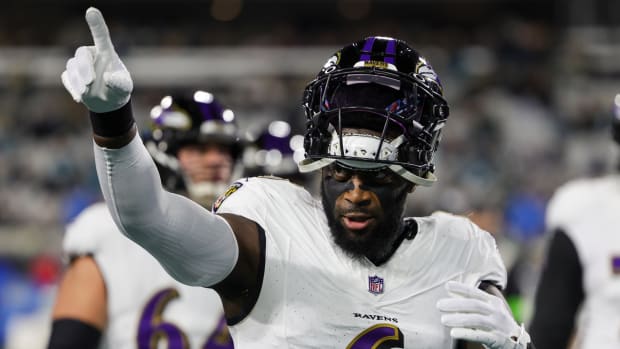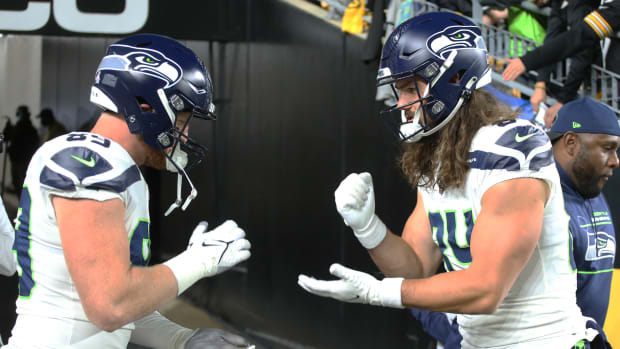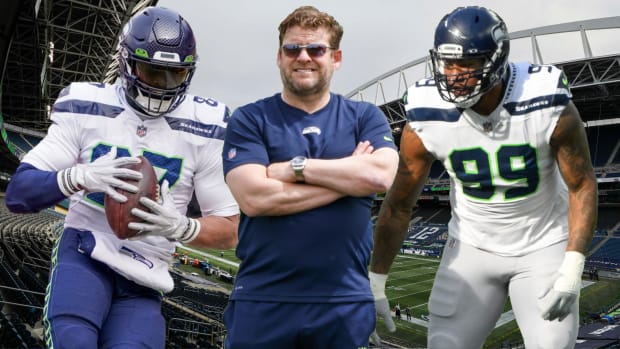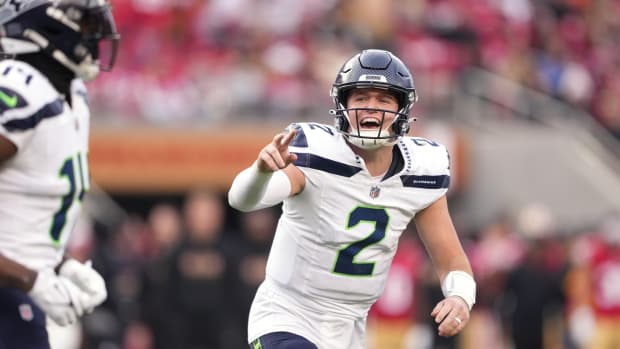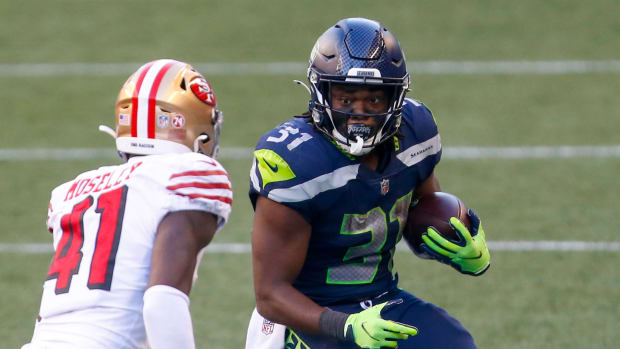Seahawks Remain Progressive Bastion in NFL Despite Colin Kaepernick Remarks
Last Thursday, coach Pete Carroll spent an hour fielding media questions, and nearly 21 of those minutes were spent discussing how to support the league's Black players. Most of the questions revolved around the Seahawks’ decision to try out free agent quarterback Colin Kaepernick twice without ever signing him.
Looking back, Carroll expressed regret in passing up on the 2012 NFC Champion and was widely criticized for his remarks.
"I regret that we weren't the one way back when that just did it just to do it, even though I thought that it wasn't the right fit necessarily for us at the time," Carroll said. "The reason it wasn't the right fit is because I held him in such a high regard I didn't see him as a backup quarterback and I didn't want to put him in that situation with Russ. It just didn't feel like it would fit right. That's the way I felt about it. So I just wish it would happen, and I wish we would have been a part of it when the time was available then."
As far as whether Seattle would consider Kaepernick now, Carroll admitted the team liked where it was with Geno Smith and Anthony Gordon as Russell Wilson's two backup options on the roster.
"We're kind of set up right now, so football-wise, it doesn't seem to fit us like I said. But there's a lot of time here. We'll see what happens."
Carroll’s reasoning for not signing Kaepernick has come under great scrutiny by analysts and commentators as seeming disingenuous and contradictory, with many believing Carroll avoided signing him because it would have created a media frenzy. Despite dubious reasoning in passing over a backup that is “too good," Carroll is not merely another white NFL figure struggling to pander to a Black audience.
The Seahawks have long been a haven for outspoken players, generous activism and charity, and strong campaigns for social justice reform, specifically justice for inequalities that largely affect the Black community. Although they didn’t sign him, everything else the Seahawks have done and continue to do demonstrates that they support Kaepernick in his ideology and cause.
Carroll's community involvement began back when he was living in Los Angeles and founded A Better LA, a non-profit that supports "community based solutions to restore peace, save lives and link individuals in the inner city to resources they need in order to thrive." His organization partners with community leaders to "bridge racial divides, create safer environments for children and families, and empower individuals to create better futures for themselves."
Since its inception in 2002, A Better LA has made a quantifiable difference in Los Angeles through a collaborative effort that empowers those who have had traumatic experiences in gangs, A Better LA "not only reduces violence - homicide rates in LA have drastically dropped since its founding - it also creates opportunities for communities to prosper so individuals can live, work, and play in peace." Not only has Carroll dedicated his time and gathered resources for underprivileged Los Angeles communities, but he's worked with and listened to community leaders on how to best overcome racial and cultural divisions to combat gang violence in the community.
While A Better LA carries on as Carroll resides in Seattle, he's become involved in his local community once again through various organizations. In 2011, Carroll teamed up with the local YMCA's Alive And Free Program to create A Better Seattle, which is essentially a Seattle equivalent to A Better LA. Like its successful counterpart, A Better Seattle seeks to "develop partnerships between corporations, law enforcement and community groups to build healthy communities and reduce youth violence."
Philanthropy is truly a "team effort" in Seattle. In 2019, the Seahawks granted a $15,000 award to Community Passageways, a Seattle-based felony diversion program that endeavors to reintegrate former felons into society so that they may lead better lives.
"The environment that Coach Carroll has created and the environment that the players have created show that they are willing to engage with the community at a high level," said Dominique Davis, the founder of Community Passageways. Davis further commented that while it's common to see NFL teams endorse national non-profits, "they don't really pay attention to the smaller organizations that are out here in the middle of shootings, grabbing kids with bullet holes in them and throwing them in a van and rushing them to the ER; that are showing up at shooting scenes and trying to stop the retaliation from happening."
Davis continued that he is proud of the Seahawks for "acknowledging a small community-based black-run, black-owned organization" dedicated to eliminating youth incarceration.
"They don't talk to us like they do the big organizations that are very visible. We're not that visible, we're kind of in the shadows. But the Seahawks were very engaging.”
Although Carroll has done his share of community outreach, it is the Seahawks players who have the most profound voices when speaking out against social injustices. Richard Sherman and Michael Bennett are two names that have made headlines when speaking out against police brutality in recent years.
“Whether they’re taking a knee or whether they’re locking arms, they’re trying to bring people together and unite them for a cause," Sherman said in a 2016 press conference.
“More videos have come out of guys getting killed, and I think people are still missing the point. The reason these guys are kneeling, the reason we’re locking arms is to bring people together to make people aware that this is not right. It’s not right for people to get killed in the street.”
When Michael Bennett chose to sit on the bench during the National Anthem in 2017 - partly in response to his experience being profiled by Las Vegas PD - he said, "I just want to see people have the equality they deserve. And I want to be able to use this platform to continuously push the message of that."
Individually, each of these players has demonstrated their belief that Black lives matter. Sherman founded Blanket Coverage, a non-profit that donates school supplies and clothing to underprivileged youth, allowing them to focus on their academic aspirations. Sherman, a Compton native who grew up and attended the prestigious Stanford, seeks to help children who grow up in similar neighborhoods and circumstances.
The Bennett Foundation is also deeply personal to the player. Michael Bennett saw family and friends struggle with obesity in his low-income community, so his foundation is dedicated to educating and empowering youth to lead healthy lifestyles.
Perhaps the Seahawks player most dedicated to fighting police brutality and racial profiling is former star receiver Doug Baldwin. The son of a former police officer, Baldwin has his own experience with police profiling as a teenager when he was wrongfully accused of stealing a car. Once Colin Kaepernick brought the conversation of police profiling into the NFL realm, Baldwin became a vocal leader on a team committed to pursuing justice. In 2017, Baldwin and his teammates launched the Seahawks Players Equality and Justice For All Action Fund, an action fund devoted to fighting injustice through leadership and educational programs.
Baldwin explained why the team felt compelled to create an action fund in addition to their various charitable causes.
"First, we wanted to do something actionable, we wanted to have an action item," Seahawks receiver Doug Baldwin said. "We've had a lot of requests from people outside of the building of, 'How can I help, where can I donate, how can I do my part?' So we wanted to give them a place to do that, but also players have an opportunity to do so as well.
"Then secondly, we wanted to have a central, unified effort, really allowing the name to speak for itself. It started here with the Seattle Seahawks players, the organization itself, and all the funds go to important programs for equality and justice, and it's an action fund to put things into action. I thought it was really comprehensive, and a very collaborative effort on the part of a lot of guys in the locker room."
Baldwin became incredibly active in the Seattle non-profit community during this time. The two-time Pro Bowler donated $1 million to constructing the Family First Community Center, which garnered him a 2018 Martin Luther King Medal of Distinguished Service in King County and a finalist spot for the 2018 ESPN's Muhammad Ali Humanitarian Award. The team's Action Fund awarded grants ranging from $15,000 to $25,000 to seven Seattle non-profits aligning with their goals, as well as partnering with Pearl Jam for a concert to help fight homelessness.
And yet there's more. Baldwin also formed the Building Bridges task force, which implores attorney generals in all 50 states to review their policing policies and procedures. Baldwin also supported the passage of Initiative 940, a measure that would overturn laws that "made it virtually impossible to bring criminal charges against police officers believed to have wrongfully used deadly force." Specifically, the initiative called for "law enforcement to receive violence de-escalation, mental health, and first-aid training, and provide first-aid; and change standards for use of deadly force, adding a 'good faith' standard and independent investigation," all of which could have prevented the recent deaths of George Floyd and Rayshard Brooks.
While Baldwin made a massive difference in protecting Seattle's youth and vulnerable populations, he also impressed his passionate advocacy upon his teammates and coaches.
"I couldn't be more proud of what he's doing," Carroll said in 2016 after Baldwin visited Washington's state capitol to champion police reform. "He continues to carry the torch and build a bridge between community and law enforcement. He's doing some marvelous stuff. I've got feedback from people he's visited with a number of times now, and he continues to be really impressive and on task. I think he's going to be a legitimate factor bringing about change."
When the Seahawks stood with their arms interlocked during the National Anthem - an idea birthed from conversations with Dr. Harry Edwards, a sports sociologist brought in by Carroll - the long-time coach expressed nothing but pride and support for the statement his players made in solidarity with Kaepernick.
"It was a statement they wanted to make, and it was not about football," Carroll said. "It was about other things, and I supported them on that 100 percent. I was proud of what was accomplished by the statement they made and what they stood for, and in terms of building that bridge, it could be a very significant thing that they've done."
Roster decisions are not as simple as fans may think. Maybe Kaepernick wouldn’t have worked well on the team. Maybe there was a decision made above Carroll’s head that kept him from being signed. After all, it’s really the general manager's call. The decision not to sign him in two prior opportunities will likely continue to be panned in coming weeks.
But Carroll himself, as well as the team culture that has flourished during his time there, exists in a space where passionate activist players can be themselves without fear of being blackballed. In Seattle, fighting for a just America isn’t controversial - it’s as commonplace as earning a spot in the playoffs.
